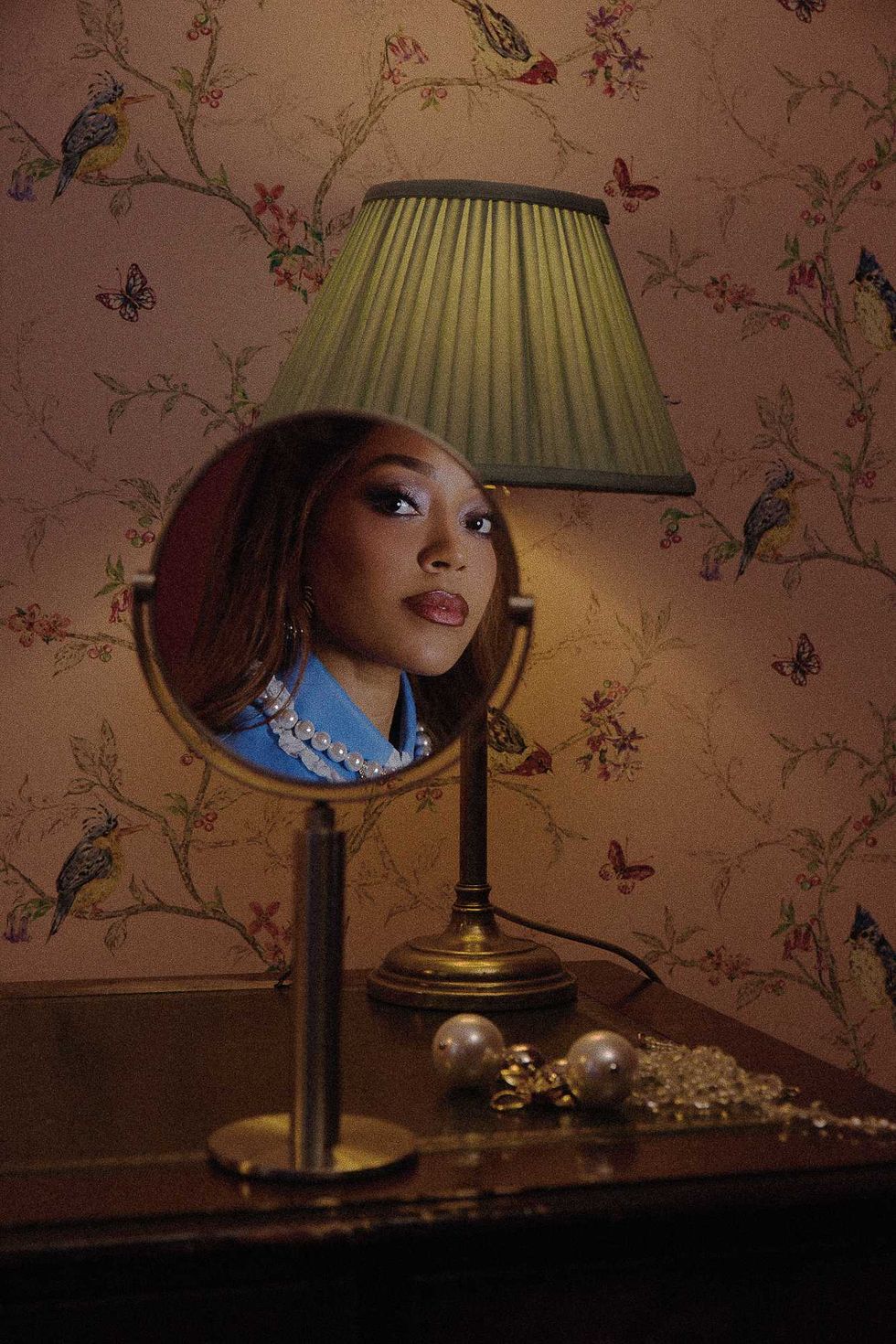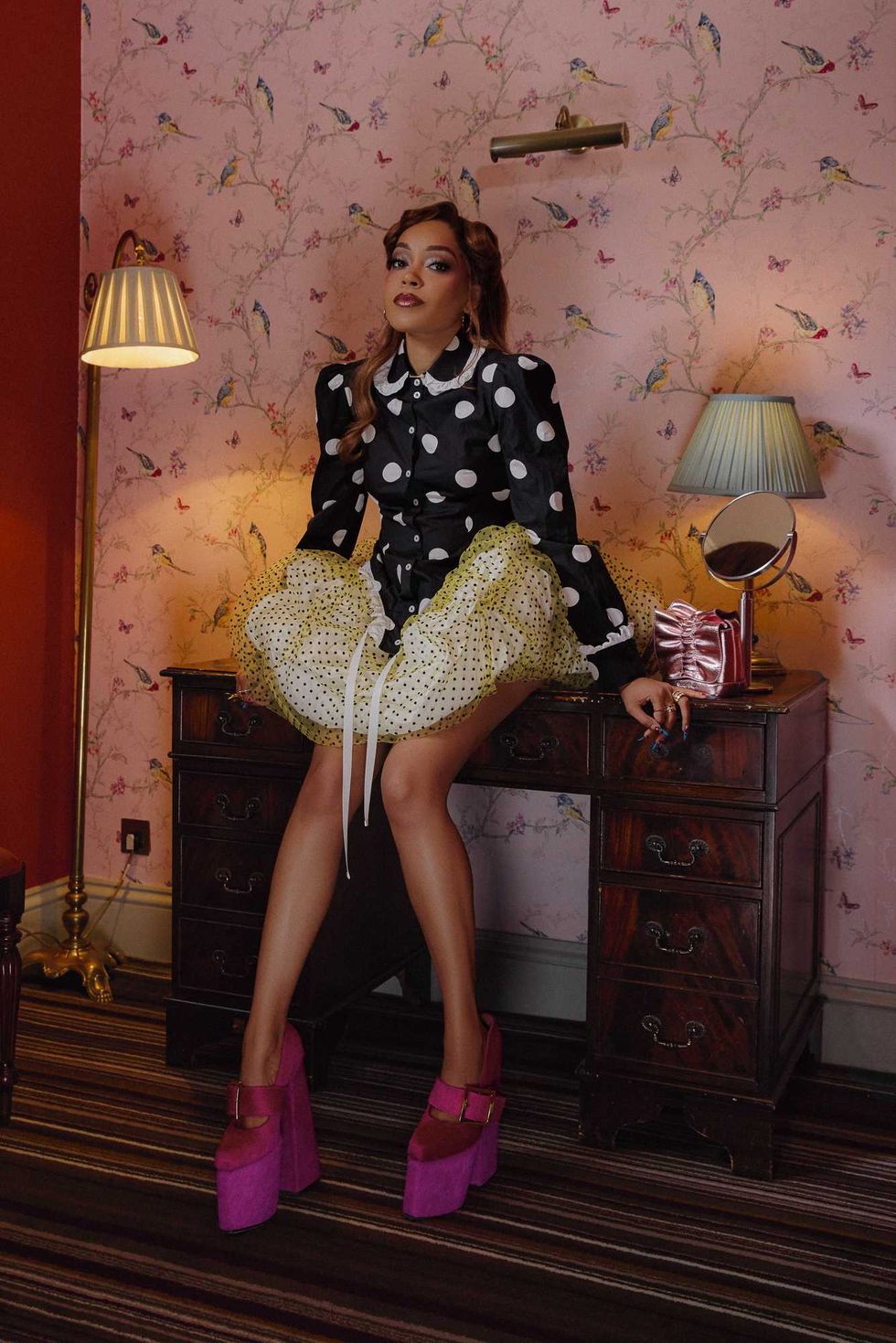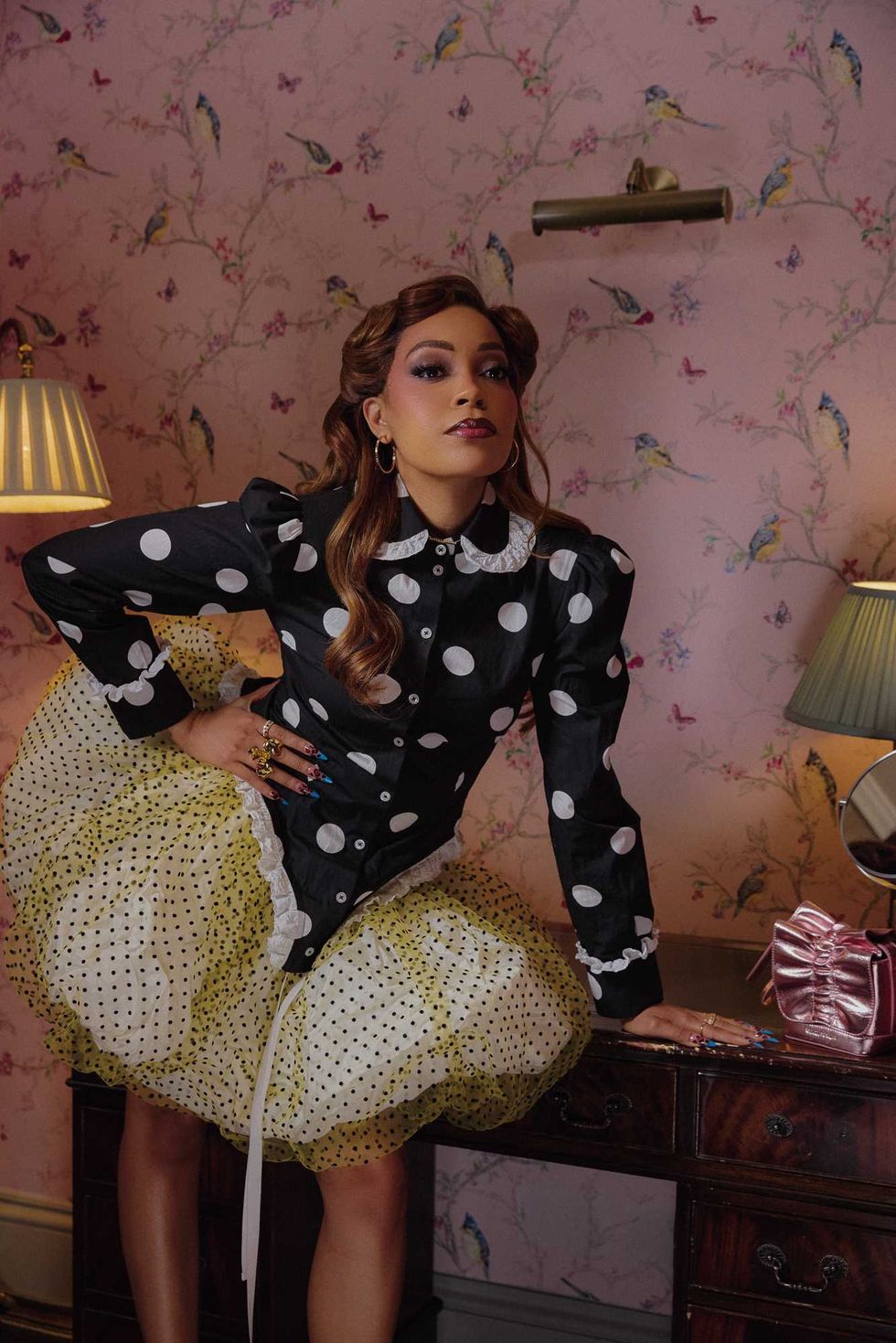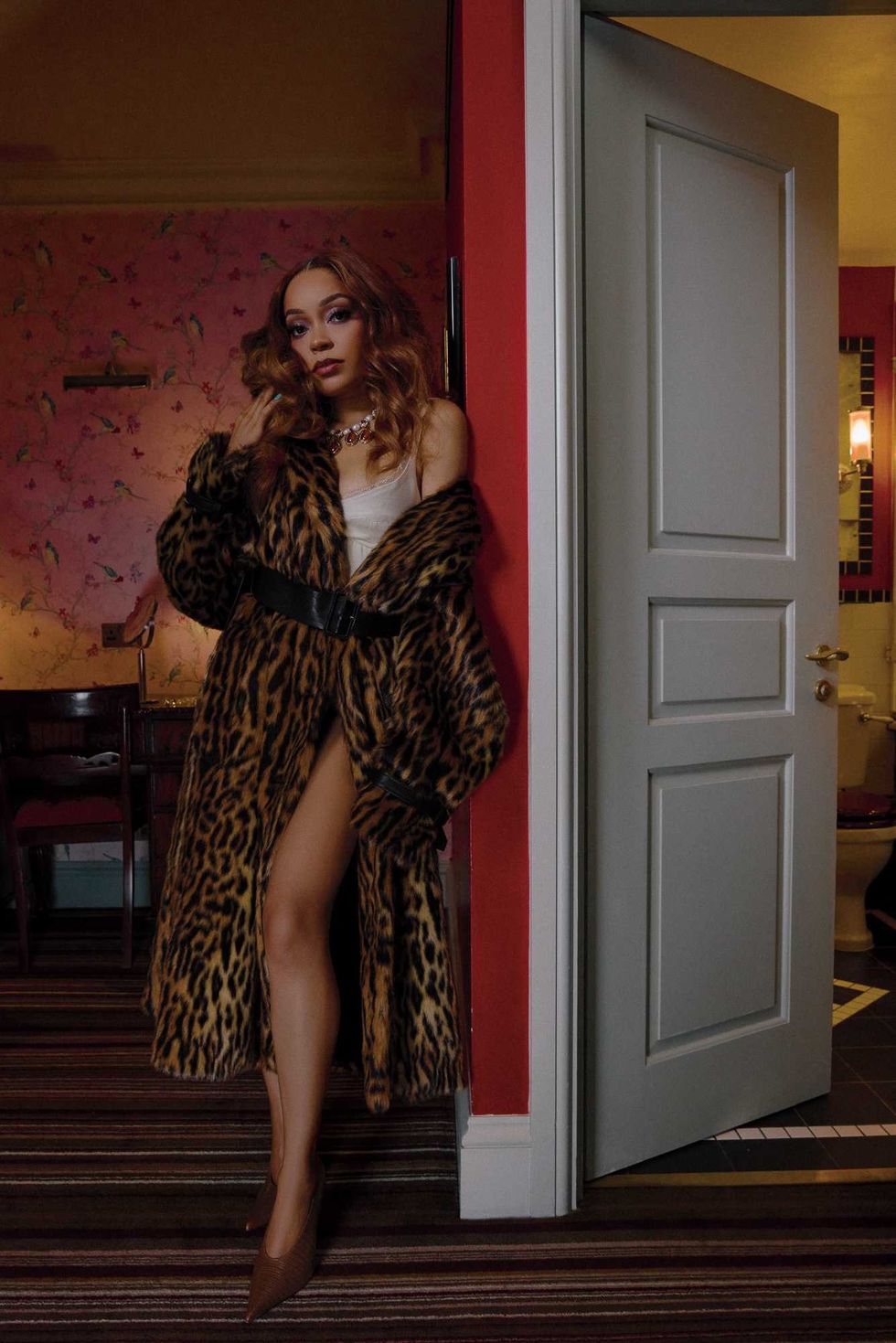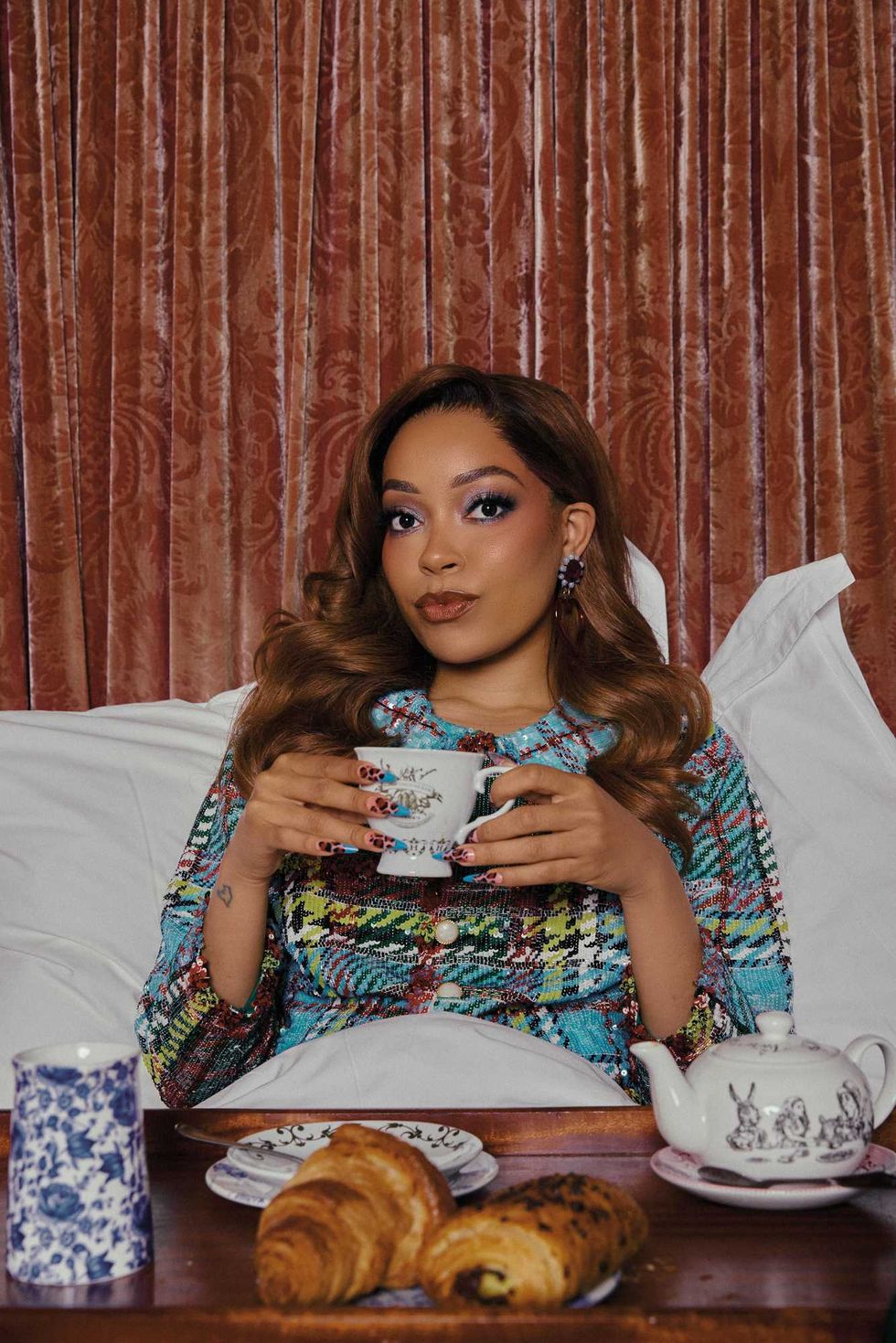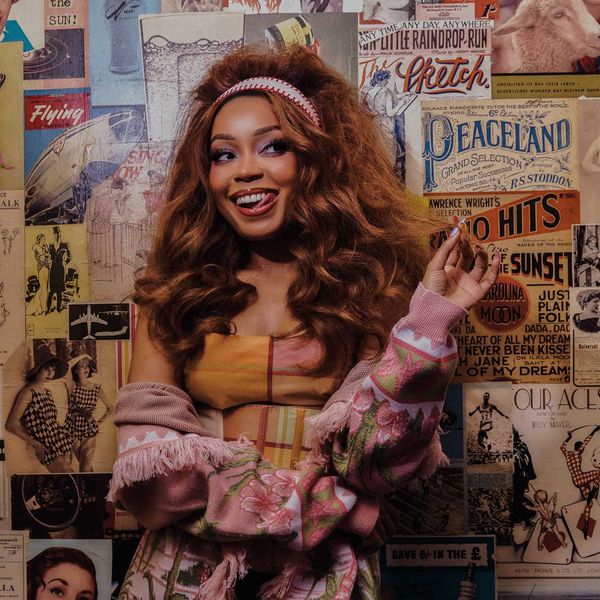
Dionne Bromfield Has Something to Say
Story by Ivan Guzman / Photography by Melanie Lehmann / Styling by Adele Cany
Nov 03, 2025
Dionne Bromfield has lived many lives in music. At just 12 years old, she was signed to her godmother Amy Winehouse’s Lioness Records, releasing her debut album and quickly stepping into a spotlight few teenagers could imagine. A follow-up arrived when she was 15 — just a week before Winehouse’s passing — and Dionne was suddenly balancing grief, expectation and fame all at once. “It was a whirlwind,” she recalls. “I wasn’t just Amy Winehouse’s goddaughter. I was starting to form my own identity.”
More than a decade later, Bromfield is ready to reintroduce herself. Now 29 and fully independent, the London-born artist has returned with new music for the first time in nearly ten years. Her latest single, “Girl,” is an empowering, soulful reflection on presence — not the kind that comes wrapped in ribbon, but the kind that can’t be bought. “You give me presents, but they’re not for free,” she sings. “I just want your presence.” Written after a relationship that prioritized luxury over love, the song channels the kind of grown-woman clarity that only comes with time, heartbreak and perspective.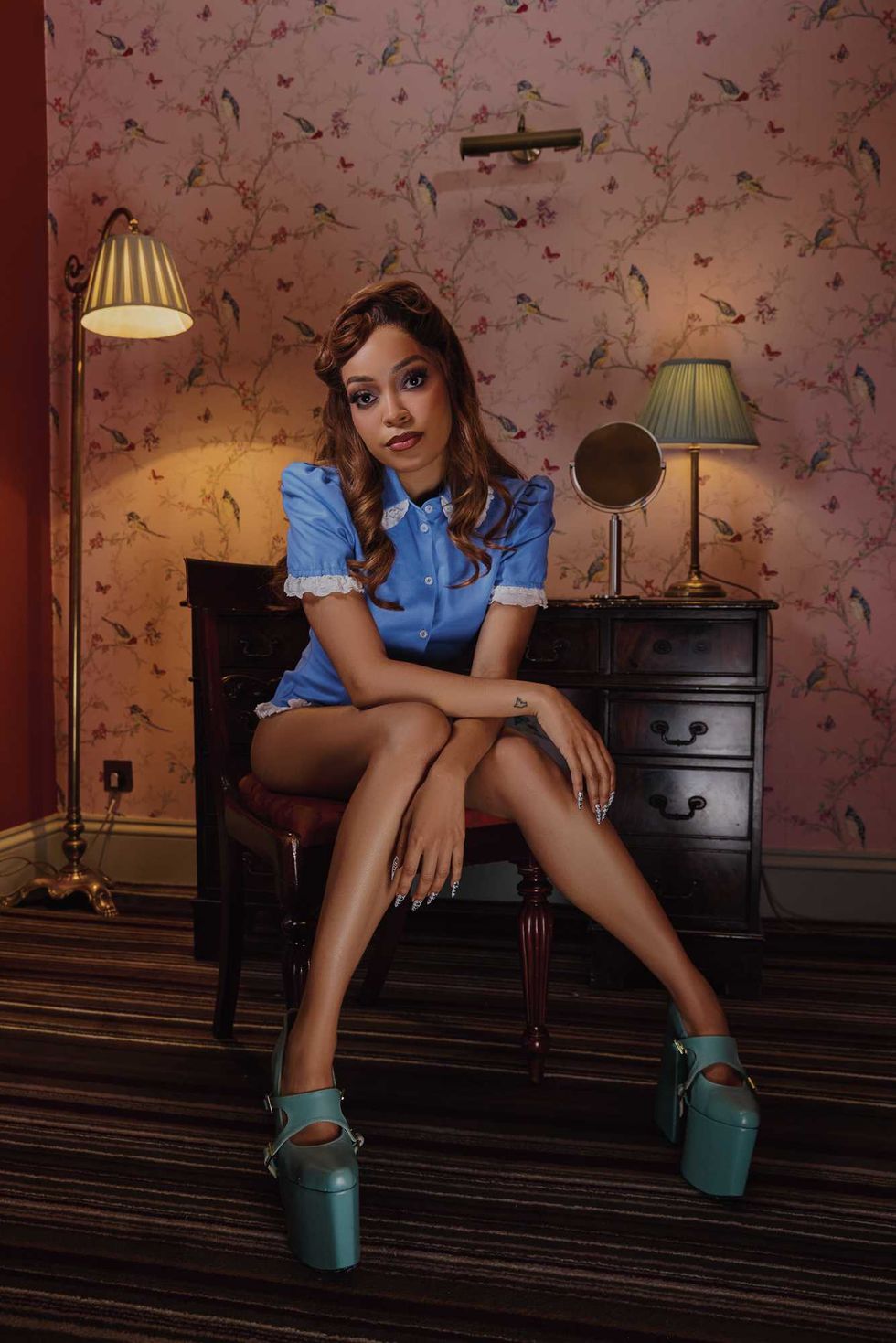
Produced by the Grammy-winning duo Blue Lab Beats, “Girl” bridges Dionne’s classic soul roots with a modern, Motown-tinged groove — the kind of sound that feels both nostalgic and freshly her own. “I wanted to keep the soul element but make it current,” she says. “Not dated, not like I’m trying to rework old records.” The result is a confident new chapter from an artist who’s found her footing outside of anyone’s shadow.
Still, Amy’s spirit remains close. Dionne admits she still catches herself wondering, Would she like this? — the same question she used to ask her mentor when showing her new lyrics. “She was a musical genius,” Dionne says. “And she would’ve told me straight if something was shit.”
For this story, PAPER photographed Bromfield at The Zetter Clerkenwell, one of London’s most beloved boutique hotels. The 13-bedroom Georgian townhouse — with its award-winning cocktail lounge, games room and dining room — sits on historic St John’s Square in East London, just a short walk from Farringdon Station. The shoot, styled by Adele Cany, captures Dionne in her element: elegant, grounded, and finally calling the shots.
Below, Dionne Bromfield talks about independence, healing, and rediscovering her voice after growing up in the orbit of a legend.
Tell me about where you are in your career and artistry right now.
For me, it’s a completely new place to be as an artist. I came up at such a young age. I got signed at 12, and my first album came out through my godmother Amy Winehouse’s label. Then I had a second album out at 15, and she passed away about a week after that record came out.
It was a whirlwind. I had just started to promote the album and was beginning to set a precedent for myself as an artist. I wasn’t just “Dionne Bromfield, Amy Winehouse’s goddaughter,” I was starting to form my own identity. Then, of course, her passing brought all that Amy connection back up again, which isn’t a bad thing. It’s not a bad person to be associated with. But I always say it’s like being married to someone really successful. You might be successful in your own right, too, but you still get labeled as that person’s partner. It’s like, hang on, I can stand on my own two feet here.
Now, doing it at 29 feels completely different. It’s been a long time. This is the first time I’ve released music officially in about 10 years. I was a young girl then; now I’m 29 and life has lifed me. I’m looking at everything from a new perspective, and I’m doing it independently. Coming out of that whole record-label system and being able to do things on my own terms, without having to answer to anyone, has been really nice.
So you’re independent now. You’re no longer on Lioness Records like back then, when you were a teenager?
Exactly. Having someone like Amy as my boss — because technically it was her label — was actually good in a lot of ways. If I ever said, “Amy, I don’t want to do that,” she’d be like, “Okay, cool, I’ve got you. Don’t tell anyone, but I’ve got you.” Then she passed away, and of course everything dissolved. I didn’t create another record with the label, and there was just a lot going on behind the scenes that didn’t feel right. So I parted ways with the label.
It must have been crazy. You were, like, 15 years old, grieving, but also her goddaughter and part of this label. It was your career, but also so personal. How did you deal with that at such a young age?
It’s funny. I think sometimes we don’t give young people enough credit for how much they can actually endure. Looking back now, I would’ve been like, “Oh my God, no work, no this, no that.” But at the time, actually being able to work and carry on doing things kind of helped me in some ways.
The only problem is, I think it affected me later in life because I didn’t really deal with it at the time. I just put my blinkers on — like, “Okay, cool, this is what it is.” I wasn’t really giving myself permission to grieve because there was so much going on. And I always say this: it’s very different when it’s somebody of such big magnitude, because they’re still being spoken about. You’re still hearing their music, so even though they’re not physically there, they still feel present. It’s only when things start to die down a bit that you’re like, “Oh God, I didn’t deal with this.”
You start looking at yourself, thinking, how did I not allow myself to grieve? I always say I’m extremely blessed to have had somebody in my corner really pushing me — to even be in a position to release music and talk to you years later. But for me, it was always about and for her too. She always wanted me to find my own footing and be myself.
I was watching the videos of you performing “Mama Said,” that last performance with Amy — and also the one on Strictly Come Dancing. In that moment, what were your thoughts? Were you even aware of how special that was? It must’ve been such a different time, like 2007 or 2008.
When I did Strictly Come Dancing, yeah, that was around 2008 or 2009. And hilariously, I had just signed my record deal. A lot of people don’t realize that many folks weren’t championing for me to actually put a record out. It was really Amy who pushed for it. If it wasn’t for her, I wouldn’t have had a record out. Plain and simple.
She was the one pushing it forward, not the label. The actual people who signed the deal didn’t even do it until about two weeks before I was meant to do Strictly Come Dancing. Did they think I was talented? Sure. Did they believe in it? To a certain degree. But if it hadn’t been for her advocacy, it wouldn’t have happened.
I remember when we got the call — they said, “You’re going to do Strictly Come Dancing,” and I thought, “Dance on it?” They said, “No, you’re going to sing on it.” Then they added, “Amy’s going to do backing vocals.” And I was like, “Okay, this is going to be interesting. Let’s see how this goes.”
Having her there was the best thing, because it made everything so much easier and more comfortable. Not many people can say they’ve had Amy Winehouse doing backing vocals for them on something of that magnitude.
I can imagine the whole record label business must be insane. But now, how would you describe this new music? Where are you pulling inspiration from? What space are you in right now?
Right now, I feel like I really know who I am. I’ve experienced life at 29 — and I mean, you can imagine how different 15 to 29 feels.
I’m 28!
Oh, okay, 96 baby, right? Yeah, same here. 29 is a good year. Enjoy it. But yeah, 15-year-old you to 28 or 29-year-old you are two completely different people, and it’s the same for me. I’ve lived a lot of life. Relationships have come and gone, good and bad. Musically, if you’d asked me two years ago if I was in the headspace to make music, I really wasn’t. I didn’t know what I wanted to do or what I wanted to write about.
Then, at the end of last year, I started working with these two guys who ended up producing a lot of my new stuff. They’re called Blue Lab Beats, a Grammy-nominated, Grammy Award–winning producer duo. I remember telling them, “I want to work with you guys,” and they were like, “Yeah, yeah, sure.” You know how the industry can be — lots of “yeah, let’s do it” and then no callbacks.
But last December, I went to an event and they were there, so I went up to them and said, “We need to work together.” They finally said, “Okay, fine, we’ve got time in January.” The industry’s usually quiet in January, so I made sure to lock it in. Once we got in the studio, everything just flowed. They understood me and what I wanted to do.
They knew I wanted to keep the soul and Motown element but make it sound current — not dated, not like I’m trying to rework old records. And they just got it. They play everything. Like, if I say, “I want to flip a ukulele on this,” they’ll literally pull one out and start playing. When you find that kind of musical partnership and it just clicks, that’s the moment every artist prays for.
What are the themes of the songs? What’s the first single like?
The first single is called “Girl.” It came from a situation where I was dating someone who could buy me all the fancy things — take me to nice places, give me nice bags — but when it came to actually being present in my life, they just weren’t there.
I remember saying to them, “I don’t really care about all the material things, I just want you.” And they said, “I’m too busy.” So I was like, “All right, cool,” and they ended up in a song. It’s really about that feeling. Like, I don’t care for that stuff anymore. I just want someone who’s physically and emotionally present. I remember telling them, “You give me presents, but they’re not for free. I just want your presence.” That line stuck with me, and I wrote it down before bed.
The next day I went into the studio and told the boys about it. They were like, “Okay, this is actually really good.” It’s got a little nod to that Motown sound, which felt right to start with — to show where I’ve come from — but it also branches out into something new for me.
Where are you currently in terms of pulling from memories with Amy, or things she taught you about songwriting and music? Did you wrestle with that while making this new work?
It’s funny, because with anything I do, I always think, Would she like this? You know what I mean? It’s just something I naturally do. When she was here, I’d always be like, “I’ve written this song, what do you think?” or “I’ve got this book full of lyrics, what do you think?”
We’re talking about someone who was a musical genius, so being able to have her as that sounding board to just ask, “What do you think?” was such a blessing. I wouldn’t say I pull from her for inspiration, though. What she wrote about and what was going on in her world was vastly different from what I’ve experienced. But I do always think, Would she like it?
Sometimes I’m like, “She’d hate this,” and I can hear her in my head saying, “This is shit.” She would’ve told me that straight up. She didn’t sugarcoat anything. So yeah, it’s more about asking myself, Would she like it? rather than, I want to make a record like Amy. I don’t want to do anything like her. Her career stands completely on its own — it’ll outlive me, outlive you, outlive everyone. No one can come close to that, nor should they.
Exactly, I agree. What’s your personal favorite Amy song?
Okay, I’ll give you two. One is “He Can Only Hold Her,” which isn’t a single. It’s on Back to Black. And then “Tears Dry on Their Own.” That’s the quintessential one.
I was just listening to Frank. You were probably like seven years old when that came out.
Too young to know what she was talking about, that’s for sure. But now, as a 29-year-old, I can listen back to that record and it still rings true today. Everything she said — there’s always someone out there who can relate, like, “Yeah, this man is giving me the same stresses she was talking about.”
Visually, what’s your vibe for this new era? How are you imagining the aesthetics or styling?
Styling-wise, I absolutely love Kelis. For me, she was the ultimate Black Barbie. I’d see her in those “Milkshake” videos wearing that Dior bustier and think, Who is this woman? She had the big afro, the colors, the confidence. I was like, “Yeah, this is the girl. This is the it-girl.”
I love her color palette and how she always had her own thing going on. I actually think she was the original alt-girl. There really wasn’t anyone doing it like that back then. And she doesn’t get enough credit for it.
But yeah, I love Kelis. She’s great. I think she’s more adventurous than me, though. I’m still very British, a bit more demure.
I mean, yeah. Flesh Tone was everything. That whole album, the sound, the visuals — so good. She’s like a chameleon, she can do anything. She just hops from different genres and styles, it’s insane. And now she’s got her own food and wellness brand!
Yeah, she looks incredible. I saw her about three years ago at an LGBTQ+ festival here in the UK, and oh my God, it was one of the best shows I’ve ever been to.
First of all, I forgot how many hits she had. And second, she can really sing, she looks amazing, she can dance. She just has this thing about her, being unapologetically herself. She’s never been one to hold her tongue or not say what she thinks, but she always backs it up. She’s not one of those people who bark just to bark. When she says something, it’s because she means it, and you’re like, “Yeah, I kind of hear that.” She’s incredible. I love Kelis.
Same. I’m literally going to listen to Kelis after this. Any last teasers or things you want to say to your fans? Anything you want to put out into the world for PAPER?
There’s a lot of new music coming. Honestly, the best music I’ve ever made. And the next single? It’s even better than this one. I’ll just say that.
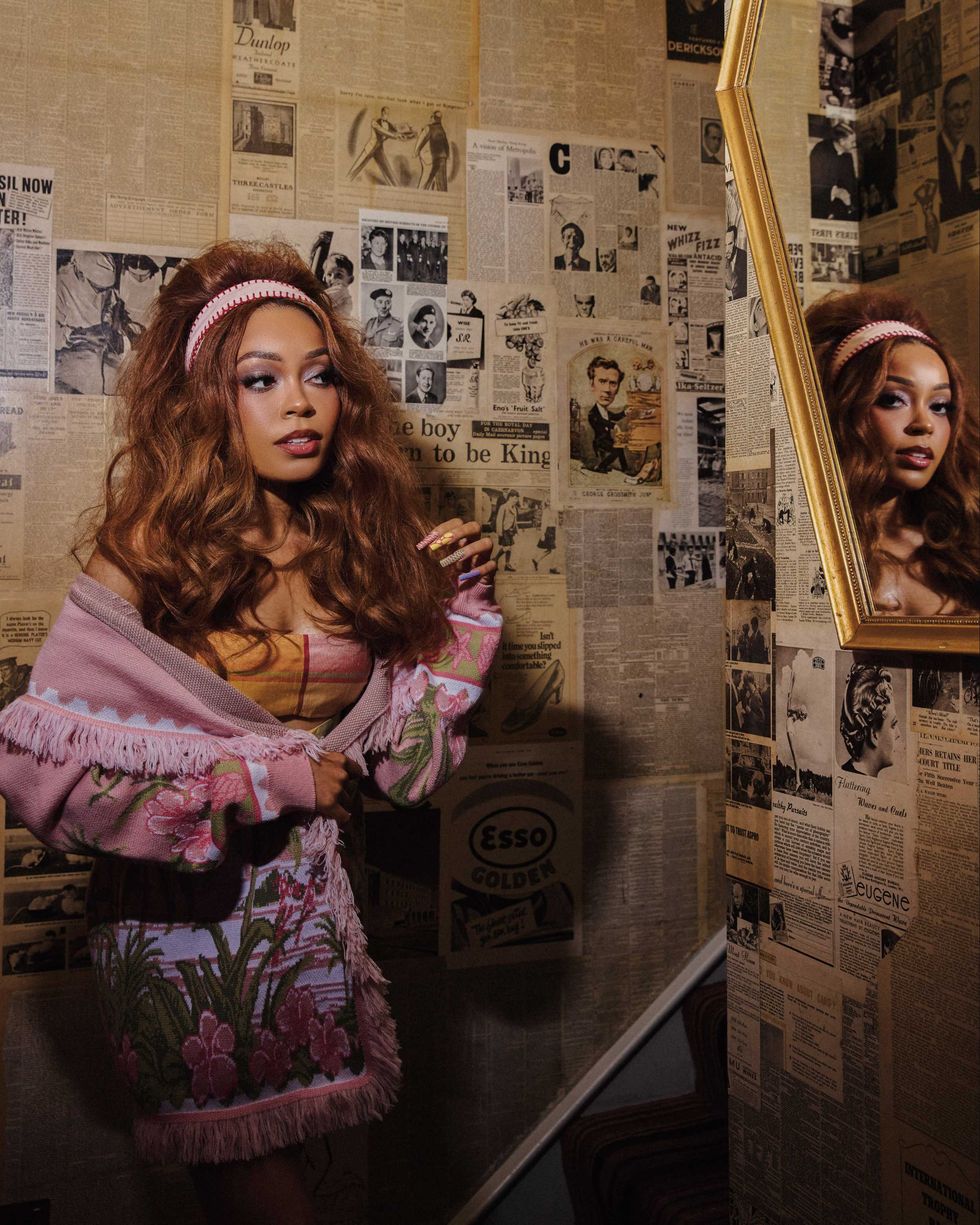
Photography: Melanie Lehmann
Styling: Adele Cany @ stella creative artists
Hair: Elvire de la Roux using Ran&co
Makeup: Moomal Moghul
Nails: Jamie Nunn using Saviour, Gellifique, Minx
Assistant: Sue Chandler Kemp
1st Assistant: Francesca Albarosa
Photo Agent: Dust Bunnies Agency
MORE ON PAPER
ATF Story
Madison Beer, Her Way
Photography by Davis Bates / Story by Alaska Riley
Photography by Davis Bates / Story by Alaska Riley
16 January
Entertainment
Cynthia Erivo in Full Bloom
Photography by David LaChapelle / Story by Joan Summers / Styling by Jason Bolden / Makeup by Joanna Simkim / Nails by Shea Osei
Photography by David LaChapelle / Story by Joan Summers / Styling by Jason Bolden / Makeup by Joanna Simkim / Nails by Shea Osei
01 December
Entertainment
Rami Malek Is Certifiably Unserious
Story by Joan Summers / Photography by Adam Powell
Story by Joan Summers / Photography by Adam Powell
14 November
Music
Janelle Monáe, HalloQueen
Story by Ivan Guzman / Photography by Pol Kurucz/ Styling by Alexandra Mandelkorn/ Hair by Nikki Nelms/ Makeup by Sasha Glasser/ Nails by Juan Alvear/ Set design by Krystall Schott
Story by Ivan Guzman / Photography by Pol Kurucz/ Styling by Alexandra Mandelkorn/ Hair by Nikki Nelms/ Makeup by Sasha Glasser/ Nails by Juan Alvear/ Set design by Krystall Schott
27 October
Music
You Don’t Move Cardi B
Story by Erica Campbell / Photography by Jora Frantzis / Styling by Kollin Carter/ Hair by Tokyo Stylez/ Makeup by Erika LaPearl/ Nails by Coca Nguyen/ Set design by Allegra Peyton
Story by Erica Campbell / Photography by Jora Frantzis / Styling by Kollin Carter/ Hair by Tokyo Stylez/ Makeup by Erika LaPearl/ Nails by Coca Nguyen/ Set design by Allegra Peyton
14 October
